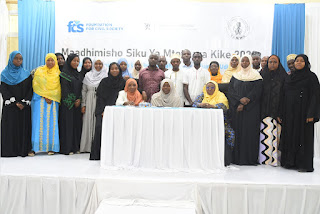Government
and civil society stakeholders are diligently engaged in the movement and the
fight against gender-based violations. To some extent, we have witnessed
successes, with several instances of individuals facing consequences for their
acts of humiliation, and perpetrators being brought to justice. However,
society continues to grapple with a significant challenge, particularly when
these acts of humiliation involve family members – the issue of evidence.
On October
28, 2023, the Tanzania Media Women’s Association - Zanzibar (TAMWA ZNZ)
observed the International Day of the Girl Child by presenting a special report
on the performance and impact of the special court for Gender-Based Violence
(GBV) in Zanzibar. The commemoration event took place at Mansoor HallFuoniNyumbaMoja
and saw the participation of diverse stakeholders, including educators,
jurists, religious leaders, anti-GBV advocates, and journalists.
During the
meeting's opening, Asha Abdi, the Chairperson of the TAMWA ZNZ board, mentioned
that the United Nations officially established the International Day of the
Girl Child on December 19, 2011. This day is annually celebrated on October 11,
and the global community designates the entire month of October to acknowledge
and commemorate the challenges that girls face worldwide.
She
emphasized that it is the society's responsibility to recognize the necessity
of nurturing self-esteem in girls and aiding them in achieving their goals
while attaining economic independence.
During
the report presentation, HauraShamte, a member of TAMWA, shared insights. She
mentioned, "Many of the respondents indicated that they experienced
positive cooperation from law enforcement, the police, the DPP's office, and
the court. Approximately 65% of the respondents reported good cooperation,
while 35% expressed a lack of cooperation," Haura explained.
Haura, who
also brings extensive journalism experience to the table, went on to mention
that the Chief Prosecutor's Office (DPP) in Unguja responded to the
questionnaire. They reported that they typically receive an average of 70 to
100 cases related to acts of humiliation each month from all district offices
in both Unguja and Pemba.
The
special report, focusing on the effectiveness of the Special Courts for
Gender-Based Violence (GBV) cases, reveals that in June 2021, Zanzibar
established Special Courts dedicated to handling such cases. To date, there are
five of these specialized courts, each presided over by eight judges. Among
these courts, three are located in Unguja, and two are situated in Pemba.
Zaina
SalumAbdallah, the Project Officer for GBV Projects at TAMWA ZNZ, emphasized
that girls encounter numerous challenges. Consequently, many organizations are
persistently working to implement various projects aimed at safeguarding and
empowering girls and women to realize their aspirations. These initiatives also
focus on enhancing their awareness of their rights and enabling them to pursue
their dreams.
"To
reach this objective, we provide education on gender-based violence issues
through the media and teach them how to report and write news related to acts
of humiliation for journalists. This equips them with theability to effectively
convey these messages to the community through the media," Zaina
explained.
Maryam
Ame Chum, a Project Officer for Strengthening Women in Leadership at TAMWA
Zanzibar, highlighted that the path to girls becoming leaders is not merely a
spontaneous occurrence. It begins with instilling confidence in their abilities
within their homes and fostering an understanding of their fundamental rights.
She added,
"Granting the girl child access to democratic rights and empowering her
from a young age offers the opportunity for self-awareness and equips her with
the strength needed to later engage in and pursue leadership roles."
Sarah
Omar Hafidh, the Judge of the Vuga Court who deals with GBV issues, emphasized,
"The community must be aware that the sentencing process is carried out in
accordance with the country's laws. If a sentence is issued, it is based on
legal principles."
This
comprehensive report was conducted over the course of one month, from June 16
to July 16, 2023. It reached eight districts and 57 shehia in both Unguja and
Pemba. A total of 71 victims' parents were interviewed, along with four
officers from the Special Courts and two Prosecutor's Offices of Unguja and
Pemba. The data collection involved the completion of 77 questionnaires.
Contributing
to the report, stakeholder working against acts of Gender-Based Violence (GBV),
FatmaHamis Ali, a legal assistant and activist, emphasized that the report
highlights an ongoing issue within the community – a lack of cooperation.
She
explained, "As activists, we make efforts to encourage family members to
provide evidence in court. However, after a judgment, such as the father's
imprisonment, these family members often find themselves isolated and lacking
support from their families."
Mwandawa
Suleiman Juma, a teacher at Chukwani Primary School, appealed to women not to
leave their children behind when they decide to leave their marriages. She
concluded, "My message to women is to take their children with them when
leaving a marriage to ensure their safety."
In 2022, a
total of 1,360 incidents of Gender-Based Violence (GBV) were reported. Among
these cases, 534 are currently under police investigation, 2 are in the DPP
(Director of Public Prosecutions) Office, 421 are in the court system, 181
incidents resulted in convictions, 139 cases led to releases, 19 cases had no
suspect found, and in 64 cases, no action has been taken.
The report
also includes recommendations for the community, suggesting that they maintain
close communication with children under the age of 18 to enable early detection
of any adverse incidents. Additionally, the report advises Civil Society
Organizations (CSOs) to continue offering training to law enforcement officers
and the general public. Furthermore, it recommends that the government take
steps to establish and facilitate the use of electronic evidence, particularly
in cases involving children, and address issues related to corruption in cases
of humiliation.






0 Comments